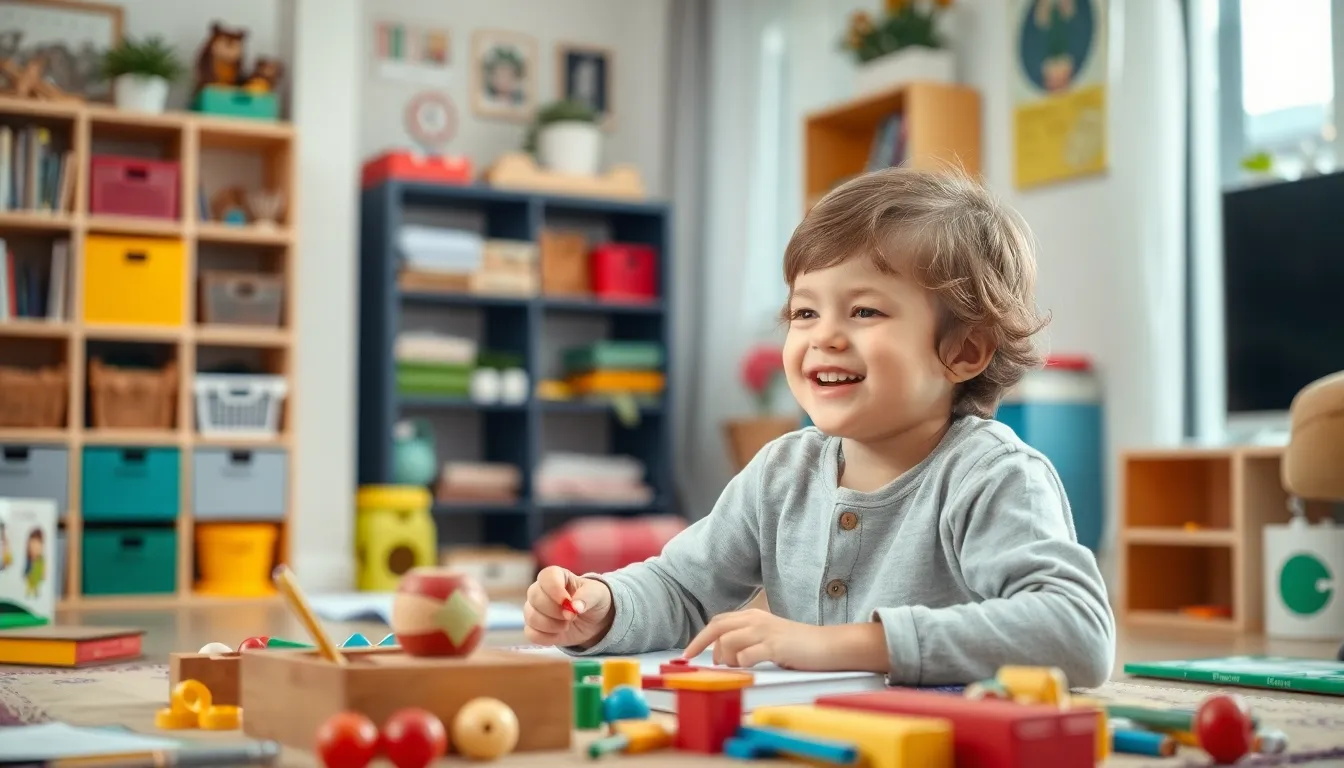Table of Contents
ToggleIn a world where parenting advice can feel like a never-ending buffet of opinions, the Montessori family stands out as a unique and refreshing choice. Imagine a household where kids learn by doing, explore their passions, and even help with dinner—yes, please! Montessori isn’t just a method; it’s a lifestyle that encourages independence and creativity while keeping the chaos to a minimum.
Picture this: your little ones confidently navigating their day, choosing activities that spark joy, and maybe even teaching you a thing or two about patience. It’s not just about academics; it’s about raising well-rounded individuals who can think for themselves. So, if you’re ready to trade in the daily grind for a more engaging and fun approach to family life, dive into the Montessori way. Who knows? You might just find that the secret ingredient to a happy home is a little freedom and a lot of curiosity.
Understanding Montessori Family
Montessori families embrace an educational philosophy centered on child-led learning. This approach cultivates curiosity and independence in children.
Principles of Montessori Education
Key principles include fostering a prepared environment, providing freedom within limits and emphasizing respect for the child’s natural development. Children engage in hands-on activities and learning materials that inspire exploration. Each principle promotes self-directed learning, allowing kids to pursue their interests at their own pace. Montessori education values collaboration and promotes social skills through group work. This structured freedom supports emotional and intellectual growth, enhancing creativity and critical thinking.
The Role of Parents in Montessori
Parents play an essential part in the Montessori education system. They create supportive home environments that reinforce learning and independence. Involvement includes modeling behaviors, encouraging exploration, and fostering a love for learning. Parents guide their children, helping them navigate challenges while allowing them to make decisions. Promoting autonomy builds confidence, helping children feel capable and secure. Communication between parents and Montessori educators enhances consistency, ensuring that values align across home and school.
Benefits of a Montessori Family Environment

A Montessori family environment provides numerous advantages that enhance a child’s growth and learning. These advantages include encouraging independence and fostering a love for learning.
Encouraging Independence
Montessori families promote independence by allowing children to make choices and explore their interests. Children receive opportunities to engage in daily tasks, such as dressing themselves or choosing their activities. This freedom within limits nurtures self-confidence and decision-making skills. Parents support autonomy by providing an organized and accessible environment, where materials are within reach. Engaging in chores fosters responsibility and ownership over their surroundings. As children learn to navigate challenges independently, they develop critical life skills that serve them well in the future.
Fostering a Love for Learning
A Montessori family environment cultivates a genuine passion for learning. Children participate in hands-on activities that pique their curiosity and imagination. Learning becomes a joyful experience when parents incorporate their interests into family activities. By emphasizing exploration and discovery, families create an atmosphere where education thrives. Parents play a vital role in nurturing that love by modeling enthusiasm and curiosity in everyday situations. Allowing children to pursue their passions leads to deeper understanding and lasting engagement with learning, encouraging them to become lifelong learners.
Implementing Montessori Methods at Home
Implementing Montessori methods at home enhances children’s learning experiences and fosters independence. Families can transform everyday activities into meaningful learning opportunities.
Creating a Prepared Environment
A prepared environment is pivotal in a Montessori approach. Organizing spaces encourages independence and exploration. Designate areas with accessible materials, such as books, toys, and art supplies, ensuring children can choose freely. Natural light and calming colors create inviting spaces. Consider using child-sized furniture to promote comfort and autonomy. Children thrive in environments where everything is within reach and arranged thoughtfully.
Activities and Resources for Families
Activities in a Montessori home incorporate practical life skills and sensory experiences. Cooking together helps develop fine motor skills and fosters collaboration. Gardening inspires curiosity about nature and responsibility. Art projects stimulate creativity and self-expression. Reading aloud each day builds language skills and nurtures imagination. Resources like Montessori learning materials offer hands-on engagement. Families can also explore community resources, such as local libraries or educational workshops, to enrich their child’s learning journey.
Challenges of a Montessori Family
Montessori families face unique challenges as they adopt a distinctive approach to parenting. Striking a balance between traditional methods and Montessori principles often proves difficult.
Balancing Traditional and Montessori Approaches
Combining conventional education techniques with Montessori philosophy presents hurdles for families. Parents sometimes find it tough to support child-led learning while adhering to societal expectations. They must navigate outside pressures, especially regarding academic achievements. Setting boundaries becomes essential for allowing freedom within limits. Creating a well-prepared environment helps mitigate conflicts between these differing approaches. Consistent communication among family members regarding educational methods fosters understanding and cooperation. Parents need to determine which practices align with their values to maintain harmony in their home.
Overcoming Misconceptions
Misunderstandings about Montessori education often complicate the experience for families. Many perceive Montessori as permissive or lacking structure, which fosters skepticism. Parents sometimes feel pressure to defend their choices to relatives or friends who have traditional views. Addressing these misconceptions requires clear explanations of Montessori principles and showcasing tangible benefits. Sharing success stories highlights how this method nurtures independence, creativity, and critical thinking. Connecting with other Montessori families provides support and reinforces the validity of their educational approach. Educating others helps create a more supportive network for maintaining Montessori practices.
Embracing the Montessori philosophy creates a nurturing environment where children thrive. By prioritizing independence and curiosity, families foster a love for learning that extends beyond traditional education. This approach not only enhances children’s growth but also strengthens family bonds through shared activities and experiences.
Parents play a crucial role in this journey by modeling positive behaviors and creating spaces that encourage exploration. While challenges may arise in balancing Montessori principles with societal expectations, the rewards are significant. Connecting with other Montessori families and sharing experiences can provide valuable support.
Ultimately, the Montessori family experience transforms everyday moments into meaningful learning opportunities, paving the way for children to become confident and self-directed learners.







